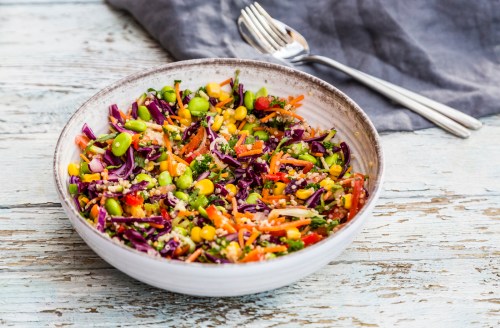5 delicious plant-based foods that are secretly complete proteins
Complete proteins can be hard to come by when you eat a plant-based diet. So we asked a dietitian to share the best complete plant proteins for easy eating.

Probably the most obnoxious question any vegetarian or vegan gets: “Are you getting enough protein?”
The short version: Yes. It’s not that hard to get your fill of protein on a plant-based diet, thanks to many high-protein plant foods like lentils, chickpeas, black beans, and more. However, many plant-based proteins are not considered to be “complete,” making them a bit trickier.
“A complete protein is a term used to describe individual foods that are sources of all [nine] essential amino acids, which are the building blocks that form together in a variety of patterns to make proteins,” says Kelly Jones RD. These essential amino acids (EAA) must be eaten from food since humans can not make them on their own, she adds.
Typically, animal proteins like meat, eggs, and dairy, are both high in protein and are considered complete proteins. While all plant foods technically contain all of the EAAs, most include a very limited amount of one or more, which lowers their overall quality and makes not all of them “complete” proteins, Jones says.
This isn’t that hard of a hurdle for plant-based eaters to overcome, because you can combine protein sources (like rice and beans) in order to form complete ones. There are also a few complete plant proteins to make things easier. “Some plant foods have high enough levels of all EAAs to increase the quality of the protein source,” Jones says.
However, a caveat: Even though there are several complete plant proteins that provide all of the essential amino acids, many don’t provide enough protein for an entire meal from just one serving. “For this reason, it’s helpful to pair some of the proteins listed below at meal or snack time, especially if you have a high physical activity level,” she adds. Still though, these are technically complete—so start thinking of the delicious ways to cook with and enjoy them.
1. Soy
Soy protein is the most recognized complete and high-quality plant protein due to the amount of protein you get per serving. Depending on how you consume it, you’ll get a decent amount of protein per serving: 100 grams of firm tofu, for example, has seven grams of protein, while an equivalent amount of tempeh (made from fermented soybeans) has 20 grams of protein. “[Soy is] often utilized as a direct meat replacement, as tofu or tempeh, in a stir fry, sandwich, wrap, pasta dish, fajitas and more,” Jones says.
Edamame is also a great option, with 100 grams providing 12 grams of protein. “Edamame, whether fresh or roasted, are great as snacks, appetizers, or salad and grain bowl toppings, as well as an ingredient in stir fry,” she says.
2. Pistachios
These nuts are one of the healthiest snack nuts out there, offering six grams of plant-based protein per one-ounce serving, to provide the body with all the essential amino acids it needs. Plus, there’s a ton of fiber too (three grams per serving)—so you will stay fuller longer. And while you can enjoy pistachios as a standalone snack, they’re also delicious as a salad topper, when ground as a crust for tofu or fish, or when blended into dips and energy bites. “You can also chop them and use as a topper for oatmeal, yogurt, and even a plant based ice cream,” Jones says.
3. Quinoa
Yes, quinoa is a complete plant protein, too—offering eight grams per cooked cup serving. “It’s often used to replace rice in grain based dishes and works well in most stir-fry or grain bowl recipes,” Jones says. It’s also great shelf-stable food to have on hand in the pantry at home, since it’s so versatile and lasts a long time.
4. Hemp seeds
One three-tablespoon serving of shelled hemp seeds provides 10 grams of complete plant protein, so enjoy them for their delicious texture and high-fat and high-protein profile. “Hemp seeds are also a great way to boost iron intake when reducing meat consumption, as well,” she says. “They’re delicious to top oatmeal, pancakes, waffles, salads, soups and more. You can also incorporate them into homemade energy bars or bites,” she suggests.
5. Chia seeds
Another high fiber and fat filled choice, chia seeds offer five grams of protein per one-ounce serving. “They’re used in smoothies, oatmeal, and mixed into yogurt, but chia pudding and jellies are also popular due to the gel-like texture they embody from soluble fiber,” says Jones. However, don’t rely on chia as your only protein source since the amount per serving is so low—rather use them to supplement and boost up your existing plant-based meals.
Looking for other vegetarian-friendly proteins? Here’s an RD’s list of healthy picks:
Sign Up for Our Daily Newsletter
Get all the latest in wellness, trends, food, fitness, beauty, and more delivered right to your inbox.
Got it, you've been added to our email list.










